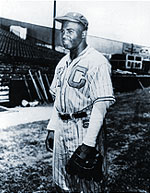|
|

The Courage of Jackie Robinson
Part 1: His Early Life
Jackie Robinson was one of the most important African-Americans in the history of the country. He was the first of his race to play baseball in the Major Leagues, a pioneer for much more than other baseball players. His quiet resolve in the face of withering criticism and nearly daily death threats led many to respect him and even support him in his quest to help his country move toward equal rights for all Americans, not only in sports but also in other areas of life.
He was born Jack Roosevelt Robinson on January 31, 1919, in Cairo, Ga. His father left the family soon after, and Jackie's mother took him to Pasadena, California, to live. Young Jack soon took the name Jackie to be what he liked to be called.
Jackie was a fierce competitor from early in his life, wanting to win whatever game he was playing: from formal sports like football and baseball to informal gatherings like dodgeball and marbles. He was fond of saying, "Above anything else, I hate to lose."
He seemed to have an effortless athletic ability at whatever sport he tried. He even won the Los Angeles Ping-Pong Championship. His brother Mack was a great athlete as well. In 1936, he won a silver medal in 200-meter dash at the Berlin Olympics, finishing second to Jesse Owens.
He went to the University of California-Los Angeles and, in 1941, became the first athlete to letter in four sports in the same year (baseball, basketball, football, track). He was the NCAA champion in the long jump and an All-American at football. In basketball, he played point guard and emphasized the fast break.
He also had a reputation when he was in college of being a fighter, willing to let his fists do the talking in response to people who insulted him.
He was drafted into army after Pearl Harbor. Second lietuenant. Court-martialed for not moving to the back of the bus. Charges were dismissed, and Jackis got an honorable discharge not long after that.
 Robinson began playing baseball for the Kansas City Monarchs, a team in the Negro Leagues, in 1945. (At that time, many African-Americans played baseball in their own leagues, called the Negro Leagues. Many of these players eventually played in the Major Leagues.) That same year saw the death of baseball's commissioner, Kenesaw Mountain Landis. This man was known to be fair about some things, but he believed that African-Americans were not fit to play baseball alongside white Americans in the Major Leagues. His replacement, Albert "Happy" Chandler, had this to say about African-Americans: "If they can fight and die on Okinawa, Gudalcanal and in the South Pacific, they can play ball in America." Robinson began playing baseball for the Kansas City Monarchs, a team in the Negro Leagues, in 1945. (At that time, many African-Americans played baseball in their own leagues, called the Negro Leagues. Many of these players eventually played in the Major Leagues.) That same year saw the death of baseball's commissioner, Kenesaw Mountain Landis. This man was known to be fair about some things, but he believed that African-Americans were not fit to play baseball alongside white Americans in the Major Leagues. His replacement, Albert "Happy" Chandler, had this to say about African-Americans: "If they can fight and die on Okinawa, Gudalcanal and in the South Pacific, they can play ball in America."
Next page > Impact on the Game > Page 1, 2, 3
|
|

 Robinson began playing baseball for the Kansas City Monarchs, a team in the Negro Leagues, in 1945. (At that time, many African-Americans played baseball in their own leagues, called the Negro Leagues. Many of these players eventually played in the Major Leagues.) That same year saw the death of baseball's commissioner, Kenesaw Mountain Landis. This man was known to be fair about some things, but he believed that African-Americans were not fit to play baseball alongside white Americans in the Major Leagues. His replacement, Albert "Happy" Chandler, had this to say about African-Americans: "If they can fight and die on Okinawa, Gudalcanal and in the South Pacific, they can play ball in America."
Robinson began playing baseball for the Kansas City Monarchs, a team in the Negro Leagues, in 1945. (At that time, many African-Americans played baseball in their own leagues, called the Negro Leagues. Many of these players eventually played in the Major Leagues.) That same year saw the death of baseball's commissioner, Kenesaw Mountain Landis. This man was known to be fair about some things, but he believed that African-Americans were not fit to play baseball alongside white Americans in the Major Leagues. His replacement, Albert "Happy" Chandler, had this to say about African-Americans: "If they can fight and die on Okinawa, Gudalcanal and in the South Pacific, they can play ball in America."
